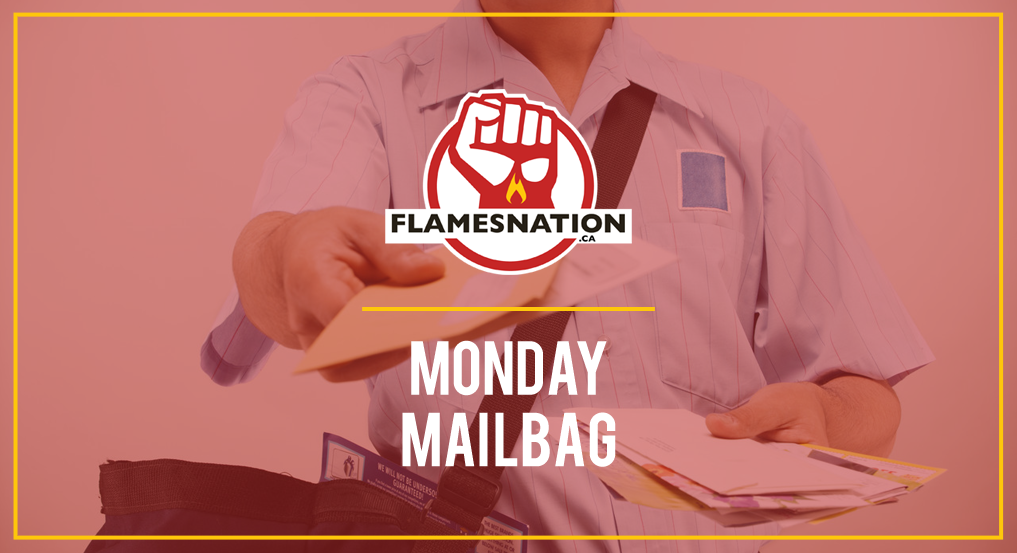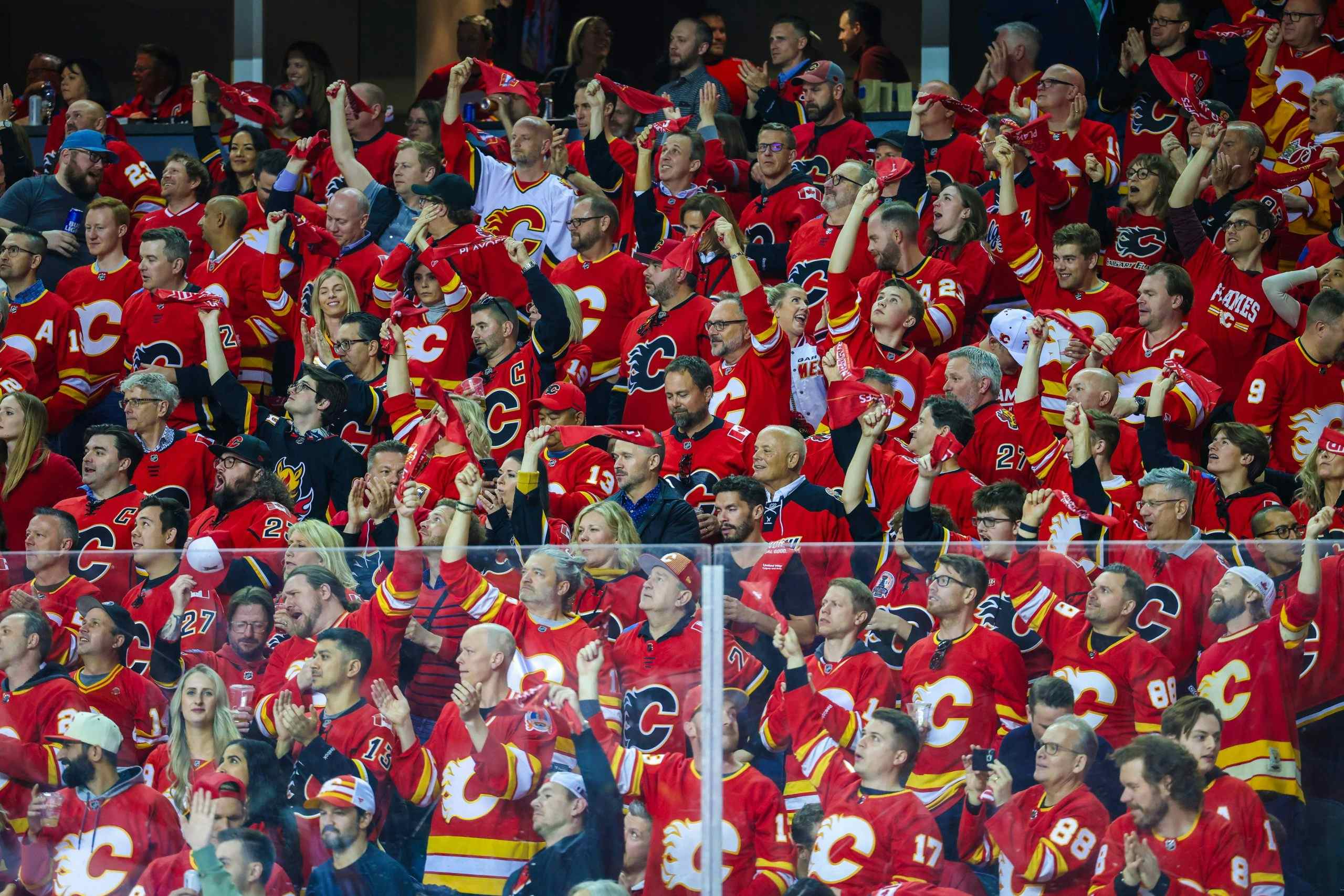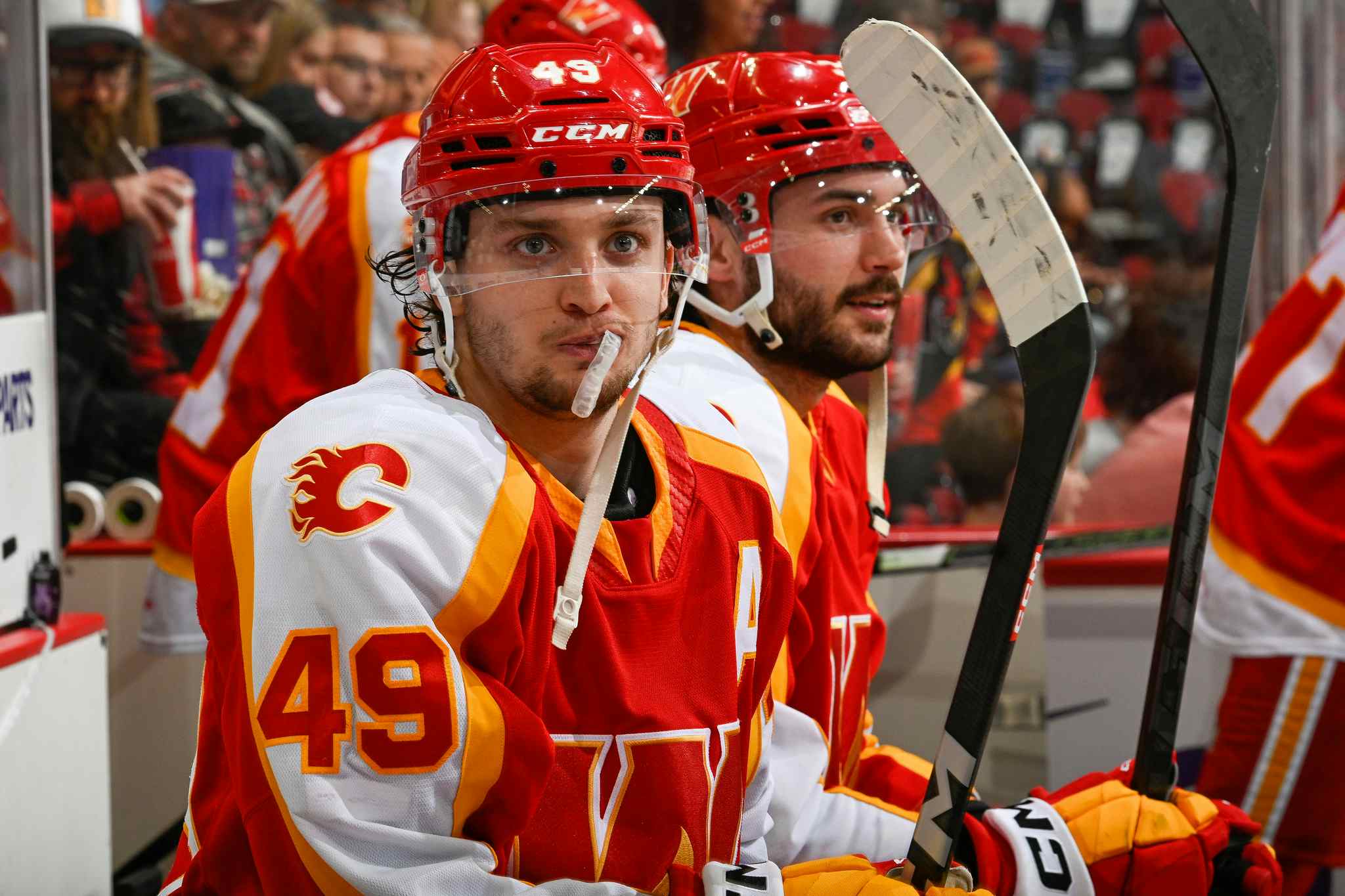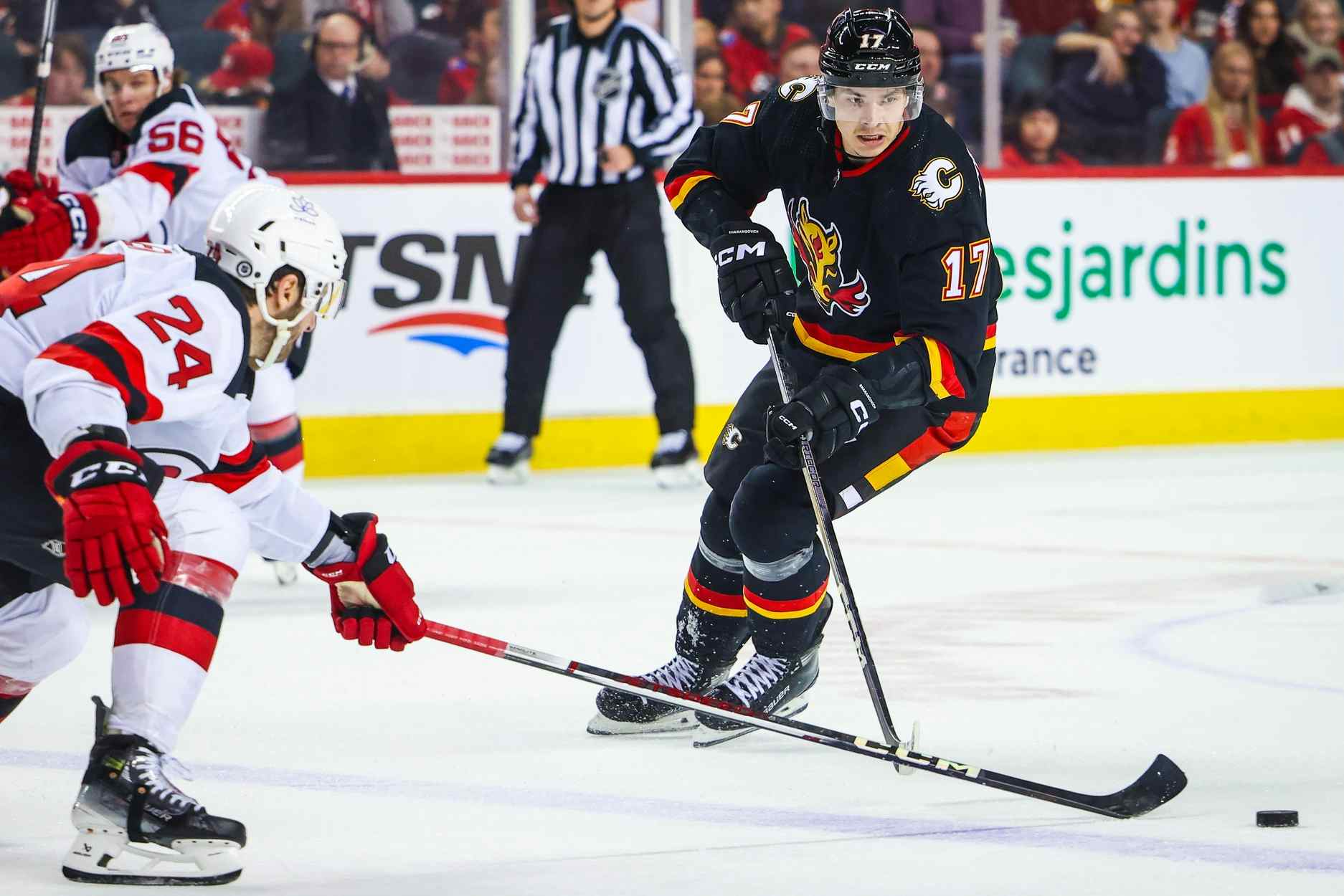FlamesNation Mailbag: Back on Bennett

Sam Bennett is the highest ever Flames pick in history, fourth overall. With that comes expectations.
Picking him was supposed to be the beginning of the end of the rebuild. In the #1 ranked North American skater the Flames hoped to have picked up an elite, offensively-minded centre with a mean edge. Someone who could even be better than rookie Sean Monahan, who potted 20 goals. Bennett would build on the centre depth already accumulated with Mikael Backlund and Monahan, providing the Flames with three potentially elite options down the middle.
His brief appearance in the 2015 playoffs, plus a promising yet inconsistent rookie year, provided some of that optimism. Given what we knew, projecting him to jump to #1 C duties so quickly after turning 20 seemed realistic.
And it’s fair to say that has all gone awry. Instead of an elite, offensively-minded centre with a mean edge, the Flames have a struggling, third line winger who takes a lot of awful penalties. That is not good nearly four years removed from being drafted fourth overall.
Here’s how far the project has sunk: Bennett’s game against the Rangers was predictable to the point of comedy. Late in the game, Bennett took an unnecessary, stupid offensive zone penalty, like so many others he had taken this year. The team giving up the shorthanded goal was pretty much out of his control, but it is just his luck that the team would give it up while he was in the box.
If you really could put Bennett’s season in a nutshell, that’s it. The guy can’t find luck if it was right in front of him, but he also doesn’t play well enough to earn a bounce or two headed his way. You create your own bounces, but Bennett just can’t create anything.
The Flames openly expressed frustration with Bennett after the Rangers game, and it’s been a long time coming. With the trade deadline approaching and the playoffs likely being decided by razor thin margins, the team is at a crossroads with their once crown jewel.
Besides what I said above, there’s very few indicators that Bennett is trending in the right direction. His underlying and scoring numbers have both seen little, if any, improvement. He’s slightly move high-event than last year, but that’s both on offence and defence. He might look better in the offensive zone, but he’s sacrificed that for lackadaisical defence.
And that would be passable if Bennett was putting up points every so often, but he’s not. Bennett (and the rest of the third line) had that magical month when he put up 13 points in 14 games, but he’s scored two since. It’s gotten to the point where Glen Gulutzan has been cutting the Bennett line’s ice time for the fourth line. In this case, it’s hard to blame him.
Youth is pretty much the only thing going for him, but it’s hard to look at that as a positive when there’s little he has done to justify optimism. I defended Bennett in early season editions of the mailbags, but as time has gone on, it’s hard to repeat those thoughts.
I’m 50/50 on this matter.
On the “no” side, there have always been players who took their time to develop, and the Flames might think they have one in Bennett. He hasn’t been up to snuff from ages 18 to 21, but stranger things have happened than a player not getting better after those years. Given that the team couldn’t put him in the AHL due to a combination of games played and age, I think there’s the possibility they feel that one more cheap year couldn’t really hurt.
On the “yes” side, it’s pretty much for all the reasons mentioned in the tweet. The Flames aren’t a rebuilding team anymore. There’s no incentive to stick kids in the NHL and let them acclimatize until the team is good again. Perhaps there are many who hate the idea of handing spots to veterans over homegrown talent, but when you have a third line that is a disaster most games, it’s an untenable situation that is costing you games in the long run. If you can dangle Bennett for a player that can actually play and provide value now, it’s a win.
What will the Flames do? I don’t know. Brad Treliving seems to hate the idea of trading away youth, and it would certainly sting to trade away the first pick you ever made as a GM, but the team needs improvement and Bennett is more of a cause than a solution. We’ll see in the upcoming weeks.
I’m sure the Sabres are also not as impressed with Sam Reinhart, but not to the levels the Flames are with Bennett.
Would Buffalo do this trade? Absolutely not. Reinhart is one of the only bright spots with that team and is fifth in team scoring, right behind the players the Sabres can realistically call their core. His struggles this year are likely because the Sabres are a very bad team and not anything personal. A rising tide will lift all ships, and I’d guess their thinking is that Reinhart will be better in time.
If that’s their logic, it’s hard to see why they want Bennett. Reinhart isn’t second overall pick great, but he’s at least something, which is hard to say about Bennett. Would you trade someone who has been reliably scoring about 0.5 PPG during his ELC for someone who hasn’t? It’s pretty much Mr. Burns’ mystery box:
Failed to load video.
Would I do this trade? Absolutely. Same age, but Reinhart has better results and is actually right-handed.
This is likely the most realistic Bennett deadline deal. Ottawa needs young players of any kind, and they’re likely to be tempted by a player who will remain cheap and could have upside. I think it would take a bit more than just Bennett, as they are probably going to be a bit sore from losing the first in the Duchene trade. Bennett and the 2019 first would probably be what Ottawa’s asking for, but I can’t see the Flames paying that much for just Hoffman.
That’s an assumption that needs challenging.
Let’s look at the best teams in recent memory, i.e. the Penguins (3x Cup champions), the Blackhawks (3x), and the Kings (x2).
For the best of the best, the Penguins and the Blackhawks, they did rely on internal development to get to the top. That is true! It is also true that they were just so lucky enough to suck at the right points in time, when being bad resulted in netting Sidney Crosby, Evgeni Malkin, Patrick Kane, and Jonathan Toews.
They tripped over their own shoelaces into a winning lottery ticket. That’s not as much proof-positive of the benefits of pure internal development as much as it is the NHL being designed to reward incompetence (if we take a trip up the QE2, we can see how repeatedly drafting high does not necessarily reap rewards if you have morons running the show. How long has Arizona been drafting in the top 10?).
The Kings built some talent with Anze Kopitar and Drew Doughty, but they also would not be multiple Stanley Cup champions without trading for Jeff Carter and Mike Richards, at the expense of Wayne Simmonds, Brayden Schenn, Jack Johnson, and two first round picks. They took young, internally developed guys and sent them packing for big name players. They won because of it.
People love pointing at Detroit as the #1 example of the benefits of developing internally, but that proves to be highly overrated under scrutiny. Take a peek at their draft history. Under Ken Holland (1997-onwards), the Red Wings have drafted a whole lot of garbage. They got lucky and built a dynasty with Pavel Datsyuk, Niklas Kronwall, and Henrik Zetterberg in back to back to back years, but there are a whole lot of squandered picks and low ceiling players picked with high leverage picks.
Their prospect pool now ranks in the bottom half of the NHL and they won’t be playoff contenders for a long time. It doesn’t really matter if you heavily use internal development, which the Wings still try to do (their AHL team won the Calder Cup last year), it is more important to draft well and effectively. One can only imagine where the team could be if they didn’t draft guys like Tom McCollum, Riley Sheahan, and Jakub Kindl in the first round. Holland was never the genius the NHL painted him to be; he got lucky in his first three drafts and rode it until he couldn’t anymore.
Certainly development from within is necessary. In a cap era, you have to have cheap, young players who can produce like they should be making five times what they are. The Penguins aren’t champions if they don’t have guys like Conor Sheary and Jake Guentzal on their roster. They also aren’t champions if they don’t trade for Phil Kessel, Chris Kunitz, and Nick Bonino. You can have a healthy dose of both, and the best teams do.
If you look at the Vegas Golden Knights, a team that is 100% not homegrown talent, this falls flat on its face. Trading is a necessary part of roster construction. Thinking in the binary of either “internal development is the only way to build a roster” or “trade away your prospects for established NHLers” is bupkiss. Not to say that the Flames should mortgage the future for whatever they can get on the market, but if they want a leg up on the competition, they’re going to have to send a young player packing. All the best teams do.
Recent articles from christian tiberi





